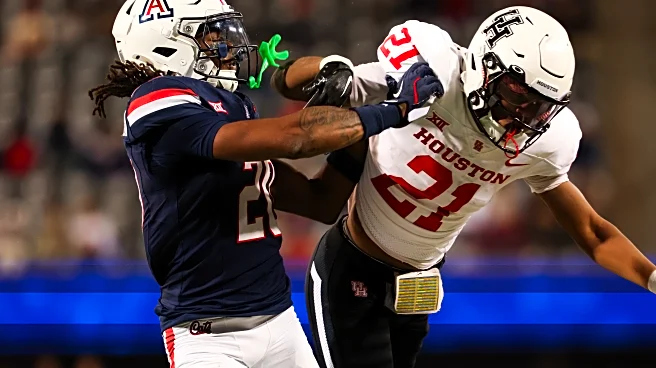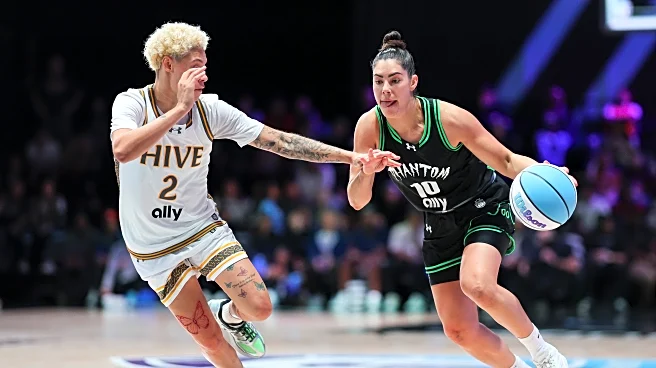Game notes
- Time and date: Saturday, October 18 at 12:00 p.m. ET
- Network: FS1
- Location: TDECU Stadium — Houston, TX
- Spread: Arizona (-1.5)
- Over/under: 48.5
- All-time series: Houston leads, 3-2
- Last meeting: Arizona 27, Houston 3 — November 15, 2024
- Current streak: Arizona, 1 (2024)
Setting the scene
One year ago, Houston and Arizona met on a November Friday night in Tucson as their disappointing seasons neared a conclusion. The Cougars and Wildcats, both in their first two years of Big 12 membership,
struggled to acclimate to the league and posted identical 4-8 records.
But 2025 is a different story as each school is righting the ship under a second-year head coach. With Willie Fritz leading the turnaround, Houston (5-1, 2-1 Big 12) is on the brink of bowl eligibility. Meanwhile, Brent Brennan only needed five games to match his 2024 win total with Arizona (4-2, 1-2 Big 12).
Either the Cougars or Wildcats continue the brighter trajectory Saturday, while the other faces a setback in an early kickoff in Houston, TX.
Arizona Wildcats outlook

Arizona is fresh off an emotional heartbreaking loss. After several lightning delays in Tucson, the Wildcats were poised to knock off undefeated BYU, clinging to a 24-14 advantage with under five minutes remaining. However, BYU managed a field goal, forced a three-and-out, and knotted the game at 24-24 on a touchdown with 19 seconds remaining before emerging victorious in double overtime.
The result stings, but Arizona showed plenty of promise on the defensive side until the final five minutes of that ballgame. Defense is the impetus driving the Wildcats’ 2025 improvement, and the mastermind behind it all is former New Mexico head coach Danny Gonzalez, who tinkered the scheme from a 4-3 to a 3-3-5 when taking the coordinator reins. The switch paid off as the Wildcats limited four of six opponents to 17 points or fewer. There isn’t a glaring area of weakness on the unit, and it ranks highly in a vast array of statistics — 27th in scoring defense, 10th in passing defense, 43rd in run defense, and 15th in total defense. In addition to recording stops, the Wildcats also create momentum-shifting plays, checking in at fifth in the FBS with 13 takeaways.
The stars of this defense reside at the safety position. The combination of Dalton Johnson and Genesis Smith is lethal at stopping the run and pass alike. They rank first and second on the team in tackles and both are frequent contributors to the turnover battle. Smith is tied for the team lead in pass breakups at five, and flying around to the ball is what the Wildcats do best. Arizona is the only FBS team that forces opponents to a sub-50 percent completion rate, and it allows the fewest passing touchdowns in the entire country.
Arizona’s front will operate with defensive end Tre Smith, but the Wildcats are no stranger to “next man up” this year, regularly thriving despite injuries to starters. Outside linebacker Riley Wilson will spearhead the pass rush and look to force Houston into third-and-long situations. Arizona is at its best on third downs, holding teams to a conversion rate of 30.2 percent — good for 17th in the FBS.
The offense features a third-year starting quarterback in Noah Fifita who guided Arizona’s 27-3 win over Houston last November. Although Fifita saw a notable dip in production last year, the quarterback is rebounding tremendously this year — even without first-round NFL Draft wide receiver Tetairoa McMillan. Fifita has 15 touchdown passes compared to four interceptions, and Arizona is comfortable letting him sling it. He averages 34.8 attempts per game and topped 370 yards on two occasions.
The Wildcats replaced McMillan with an entire committee of receivers, as Javin Whatley, Kris Hutson, Chris Hunter, and Luke Wysong all total between 229 and 328 receiving yards at the moment. There is no overwhelming target Houston must key on, but the passing game is primarily wide receiver-led as no tight ends nor running backs rank top-seven on the roster in yards.
Running backs Ismail Mahdi and Quincy Craig do play a role in guiding an effective run game, averaging 5.7 and 7.4 yards per carry, respectively. However, establishing the run hasn’t been a determinant to Arizona’s success as a team. It tallied 164 in last week’s double-overtime loss to BYU, yet just 45 in a 41-13 domination of Oklahoma State two weeks ago.
Houston Cougars outlook

Houston was 17 fans away from setting a new program record last outing at TDECU Stadium. Although the environment delivered, the Cougars couldn’t shake a Texas Tech team that’s done nothing but obliterate its competition this year. But what the Cougars did manage successfully was their response. They stormed into Stillwater and flew past Oklahoma State in 39-17 fashion — marking Houston’s largest margin of victory in a conference game since joining the Big 12.
With 39 points in Week 7, Houston set a new record for points in the Willie Fritz era. The Cougars were second-to-last in points per game a year ago, but the offense has traveled a long way under first-year coordinator Slade Nagle and quarterback Conner Weigman. Weigman returned after missing the second half of the Texas Tech game with a concussion and delivered his best showing since arriving last December. He set season-highs in passing yards (306) and efficiency (70.0 completion rate), and he’s led the Cougars to 36+ points in two of three Big 12 games this year.
Weigman may be without one of his top receivers Saturday as Stephon Johnson Jr. is listed as “doubtful” on the Big 12 availability report. The pairing connected on several deep shots down the sideline this year, and Johnson averaged 21.2 yards per catch as a result. Receivers that must step up include yards leader Amare Thomas who collected 157 yards in the Oklahoma State game — the most for a Houston receiver this season. Harvey Broussard is another player that saw a season-best performance in Stillwater, and his on-field reps will likely skyrocket this week. Other pieces holding the receiving game together are lead tailback Dean Connors (who snagged a highlight one-handed touchdown last week) and tight end Tanner Koziol. The 6’7”, 250 pound Koziol is a short-yardage savant, snagging a team-high 30 receptions for 310 yards after transferring in from Ball State.
Houston turned its last-ranked red zone offense from 2024 into a strength in 2025, coming away with points on 91.7 percent of trips inside the 20-yard line. However, the Cougars have 11 red zone touchdowns compared seven red zone field goals this year. Kicker Ethan Sanchez is extremely reliable at 14-of-16 (and 8-of-10 beyond 40 yards), but finishing possessions is an emphasis moving forward.
The offense is the most improved unit for Houston, but the defense remains the signature of this team. The Cougars rank 23rd nationally in scoring defense and 25th in total defense, thriving particularly in protecting the air. Houston features tremendous depth in a transfer-led secondary consisting of playmakers with great closing speed like Will James, Zelmar Vedder, and Marc Stampley II. Returning standouts Latrell McCutchin and Kentrell Webb round out a defensive backfield limiting opponents to 181 yards per game on a 59.8 completion percentage.
Something that really jumps off the page is Houston’s leading tackler. Standing atop the list is 6’1”, 295 pound defensive tackle Carlos Allen, who has 43 tackles — the most of any FBS defensive tackle. Allen enjoyed an excellent showing at Arizona last year with 1.5 sacks, and he remains a force on Houston’s d-line, securing numerous stops at the first-level on a weekly basis. Still, the Cougars look to develop a stronger pass rush as nobody on the roster currently claims more than 2.5 sacks. They’ll turn to Eddie Walls III and Corey Platt Jr. to pierce through a Wildcat offensive line allowing an average of 2.3 sacks through six games.
Prediction
You probably couldn’t select two Big 12 teams more identical at the moment than Arizona and Houston. Both teams rank very similar in offensive and defensive metrics alike and are far more advanced on-field products than the ones we saw in last year’s Friday night showdown in Tucson.
The trajectories of the Cougars and Wildcats suggest this will be a lower-scoring game where the passing defenses produce a slew of third down stops. Both teams will need to ignite their run games — which haven’t been the primary strength of the offense — in order to create more offensive success Saturday. This should be a back-and-forth contest down to the wire, and Arizona escapes thanks to its ability to manufacture takeaways on a whim.
Prediction: Arizona 24, Houston 20










